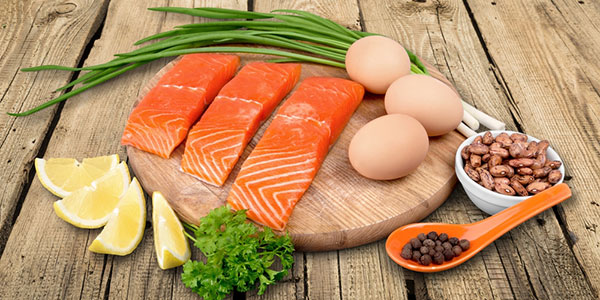11 Different Sources of Lean Protein to Maintain Muscle and Lose Fat
11 Different Sources of Lean Protein to Maintain Muscle and Lose Fat
Along with carbohydrate and fat, protein is an integral diet component. In addition to animal products, protein can be found in plant-based sources, an alternative for individuals following a vegetarian or vegan lifestyle. Open up your protein horizons and take a bite out of these 11 different sources!

When you think of protein, the brain typically automates to muscle gain and weight loss. The intake of protein excels health benefits when lean sources are consumed, rather than processed meats high in fat and salt. In addition to animal products, protein can be found in plant-based sources, an alternative for individuals following a vegetarian or vegan lifestyle. Open up your protein horizons and take a bite out of these 11 different sources!
Animal Meats and Products
1. Chicken
Chicken is a simple, go-to protein that pairs well for a variety of flavors. Add fajita seasoning for Mexican night; top with tomato sauce, parsley, and oregano for a light Italian spin; or pair with your favorite seasonal veggies!
2. Turkey
Either ground turkey, turkey breasts, or from the deli, this white meat is a lean source of protein. If choosing deli turkey, go straight to the butcher. Lunch meats found in the refrigerated, pre-packaged aisle can be loaded with sodium.
3. Steaks
Red meat gets a bad reputation based on current research regarding cancer risk. However, steak is not only rich in protein, but in iron. Recommendations suggest to limit red meat to two servings per week to reduce the risk of cancer. Choose lean cuts such as sirloin to reduce fat.
4. Eggs
Don't leave the infamous, cholesterol-containing egg off your breakfast plate! Cholesterol and yolks previously had a "bad egg" reputation but new research shines light on allowing eggs into a healthy diet. The egg white is rich in protein and the yolk contains fat soluble vitamins. If worried about cholesterol, leave the yolk out and resort to the cholesterol-less egg white.
5. Canned Tuna
Fish is an excellent source of protein at a low calorie and dollar cost. When choosing canned tuna and fish, try to look for products that do not contain added salt and are preserved in water.
6. Shrimp
Whether fresh or frozen, indulging on shrimp can keep the body full without packing on calories. Throw shrimp in salad, pair with sautéed veggies, or enjoy simply on their own for a protein-rich snack.
Meatless Options
7. Black Beans
Beans are not only rich in protein, but pack a ton of fiber. Beans are conveniently cheap and extremely versatile - throw in salads, add in casseroles, create chili, or make into a dip.
8. Quinoa
Although quinoa is a popular swap for rice, it offers a little more than that traditional white grain. Quinoa is special, as it is a complete protein, which is hard to find in a plant-based source.
9. Tofu
Made from soybeans, tofu is an excellent source of protein. Tofu does a good job of taking flavor of the dish it has been added to, making it a seemingly versatile product. Along with protein, tofu also contains those "healthy" fats known as monounsaturated and polyunsaturated fats.
10. Edamame
Looking similar to pea pods, edamame bargains a protein punch. Simply eat this soybean steamed and from the pods, topped on salads, or incorporated into casseroles.
The Importance of Protein
Along with carbohydrate and fat, protein is an integral diet component. In addition to building muscle and weight loss, protein also has roles in cell integrity and communication, hormone production, and immune protection. Enzymes are proteins that help facilitate chemical reactions such as muscle contractions and nerve impulses. The hormone, insulin, is a protein hormone and is critical in the maintenance and control of blood sugar regulation. Protein also help create antibodies, a key component in the immune system that helps the body fight against foreign invaders that could trigger inflammation and infection.
The functions listed above generally occur naturally with adequate protein. However, choosing lean protein products reduces saturated fat and calorie intake. The American Heart Association recommends less than seven percent of total calories comes from saturated fat. Minimizing saturated fat in the diet has been shown to reduce the risk of heart disease with reduced LDL cholesterol, triglycerides, and blood pressure levels. Additionally, plant-based diets and proteins have been shown to lead to lower body mass indexes (BMIs).
-
What happens if you gain back weight after gastric bypass surgery?
If you begin to regain weight after gastric bypass surgery, talk to yo
-
What Is The Most Efficient Way To Achieve Tummy Weight Loss?
When it comes to stomach weight loss there are many different factors
-
Gastric Bypass Surgery Benefits And Costs
Many cases of obese and morbidly obese people go far beyond the issues
-
Whats Liposuction About?
Liposuction is a form of cosmetic surgery that aims to remove fat
-
Amazing Foods That Will Help You Lose Weight
-
The 100 Calorie Diets Top 100 Fat Fighting, Fat Burning, Fat Melting And Fat Flushing Foods
People ask me all the time how they can lose weight faster on The 100
- DON'T MISS
- Strategies You MUST Know if You Ever Want to Stand a Chance of Getting a Flat Stomach with 6-Pack Abs
- Ugly Belly Fat - This Common But Amazing Spice Can Be Your New Secret Weapon To Get Rid of Belly Fat
- How To Deal With The Psychological Aspects Of Weight Loss
- How to Lose 10 Pounds Quickly?
- 10 Great Ways To Burn More Fat
- Nitric Oxide Supplement Nox Edge
- Eliminating Weight Gain From Stress
- Gastric bypass surgery may reverse type 2 diabetes due to improved insulin sensitivity
- Why Should You Use The Weight Loss Products?
- Reduce Weight — Ways to Handle This type of Difficult task




